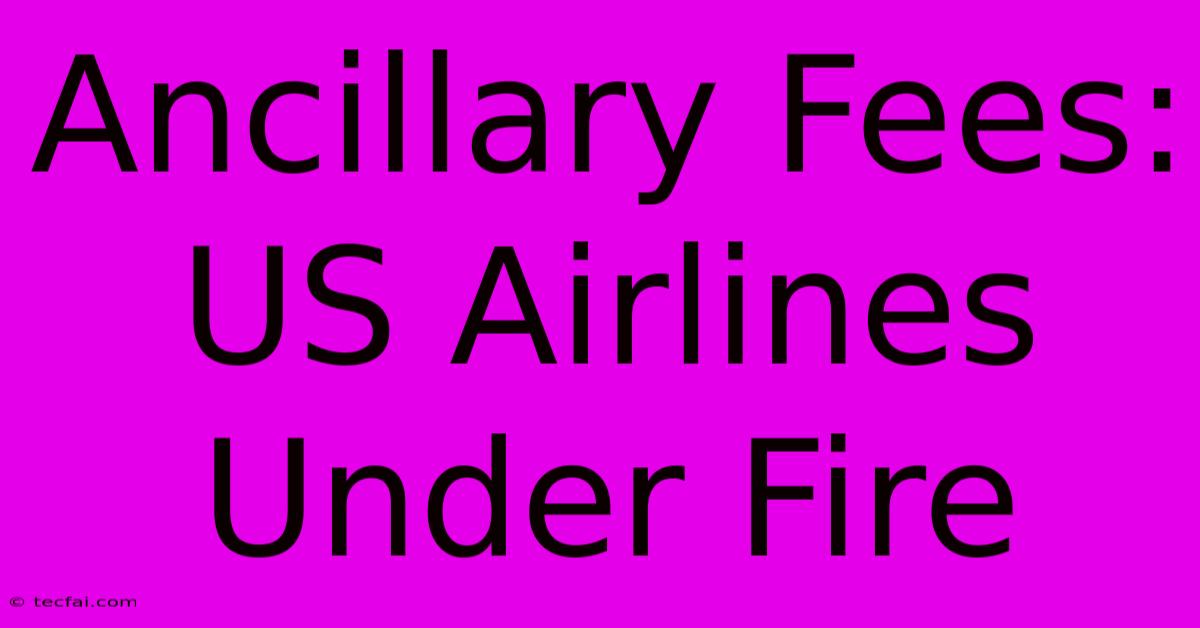Ancillary Fees: US Airlines Under Fire

Discover more detailed and exciting information on our website. Click the link below to start your adventure: Visit Best Website tecfai.com. Don't miss out!
Table of Contents
Ancillary Fees: US Airlines Under Fire
US airlines are facing increasing scrutiny over their ancillary fee practices. These extra charges, tacked onto the base airfare for services once considered standard, are causing a significant backlash from passengers and prompting calls for greater transparency and regulation. This article delves into the controversial world of airline ancillary fees, exploring their impact on consumers and the ongoing debate surrounding their fairness.
The Rise of Ancillary Fees: A Revenue Goldmine
The airline industry's embrace of ancillary fees is a direct response to the pressures of a highly competitive market and fluctuating fuel prices. By unbundling services and charging separately for baggage, seat selection, in-flight meals, and even priority boarding, airlines have found a lucrative new revenue stream. While initially presented as optional extras, the cumulative cost of these fees often surpasses the initial airfare itself, leaving passengers feeling nickel-and-dimed.
What are the Most Common Ancillary Fees?
-
Checked Baggage Fees: Perhaps the most notorious ancillary fee, airlines charge significantly for each checked bag, often varying by weight and even destination. This has led to a surge in passengers opting for carry-on luggage only, leading to increased congestion at airport gates.
-
Seat Selection Fees: Choosing a specific seat, particularly those with extra legroom or better views, often incurs an additional cost. Families traveling together may find themselves separated unless they pay extra to sit together.
-
In-Flight Meal and Beverage Fees: Once a standard offering, meals and drinks are now often sold separately, leading to additional costs for those wanting anything beyond water.
-
Change and Cancellation Fees: Modifying or canceling flights frequently involves substantial penalties, adding extra financial burden for unforeseen circumstances.
-
Priority Boarding Fees: For those wanting to board early and avoid the rush, airlines charge for priority boarding, increasing their revenue at the expense of passenger convenience.
The Consumer Backlash: A Growing Dissatisfaction
The cumulative impact of these fees has led to widespread consumer frustration. Passengers are increasingly voicing their concerns about the lack of transparency surrounding ancillary fees, often hidden deep within the booking process until the final checkout stage. This lack of transparency, coupled with the escalating costs, contributes to a perception of unfairness and deceptive practices. Social media is rife with complaints about unexpectedly high final prices, fostering negative brand perception among travelers.
The Regulatory Landscape: Calls for Reform
The growing consumer discontent has spurred calls for greater regulatory oversight of ancillary fees. Some advocate for increased transparency, mandating that airlines clearly display all fees upfront during the booking process. Others suggest implementing caps on certain fees or requiring airlines to include all costs in the advertised fare. The debate is ongoing, with legislators weighing the need to protect consumers against the potential for exploitation while also acknowledging the airlines' need for financial stability.
The Future of Ancillary Fees: A Balancing Act
While the widespread adoption of ancillary fees seems unlikely to disappear entirely, the intense public scrutiny and calls for reform are forcing airlines to re-evaluate their strategies. We can expect to see a move towards greater transparency, possibly through clearer upfront pricing and improved communication of fees. Finding a balance between revenue generation and fair consumer practices will be a key challenge for the industry in the years to come. The focus will shift towards providing better value for money and ensuring a more positive passenger experience. The future likely involves innovative pricing models that offer more flexibility and choices to travelers, while still allowing airlines to maintain their profitability.

Thank you for visiting our website wich cover about Ancillary Fees: US Airlines Under Fire. We hope the information provided has been useful to you. Feel free to contact us if you have any questions or need further assistance. See you next time and dont miss to bookmark.
Featured Posts
-
Rogan Musk Address Us Podcaster Backlash
Nov 28, 2024
-
England Vs Nz 1st Test Live Score
Nov 28, 2024
-
Fa Probes Coote Leeds Yellow Card Review
Nov 28, 2024
-
Conclave Oscar Tipped Thriller Review
Nov 28, 2024
-
Upgraded The Worlds Longest Fight
Nov 28, 2024
